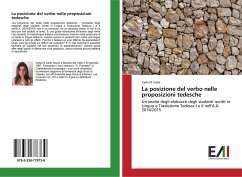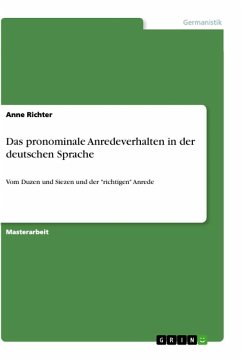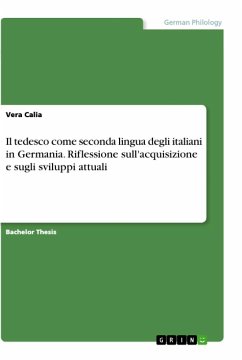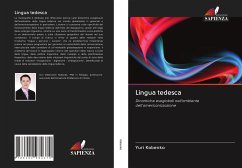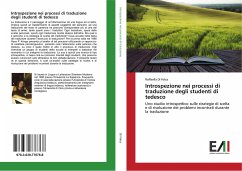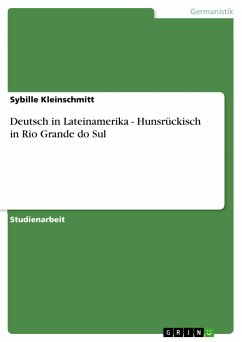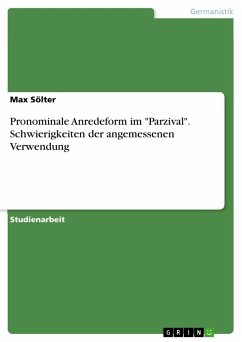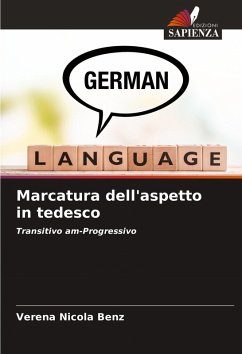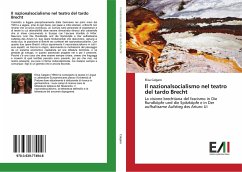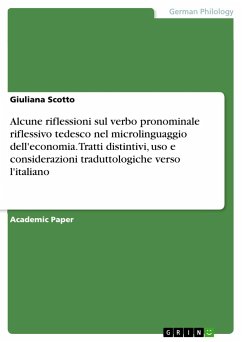
Alcune riflessioni sul verbo pronominale riflessivo tedesco nel microlinguaggio dell'economia. Tratti distintivi, uso e considerazioni traduttologiche verso l'italiano
Versandkostenfrei!
Versandfertig in 1-2 Wochen
17,95 €
inkl. MwSt.

PAYBACK Punkte
0 °P sammeln!
Academic Paper from the year 2018 in the subject German Studies - Linguistics, grade: 1, University of Rome "La Sapienza", language: Italian, abstract: L¿articolo analizza l¿uso del riflessivo all¿interno di un manuale di economia in lingua tedesca edito nel 2015 in sedicesima edizione e adottato in molti corsi universitari germanofoni. Dopo alcune considerazioni generali su come la più autorevole linguistica contemporanea, sia tedesca che italiana, affronta la forma riflessiva, si delinea il campo di indagine: all¿interno del corpus prescelto sono considerate tutte le forme verbali colle...
Academic Paper from the year 2018 in the subject German Studies - Linguistics, grade: 1, University of Rome "La Sapienza", language: Italian, abstract: L¿articolo analizza l¿uso del riflessivo all¿interno di un manuale di economia in lingua tedesca edito nel 2015 in sedicesima edizione e adottato in molti corsi universitari germanofoni. Dopo alcune considerazioni generali su come la più autorevole linguistica contemporanea, sia tedesca che italiana, affronta la forma riflessiva, si delinea il campo di indagine: all¿interno del corpus prescelto sono considerate tutte le forme verbali collegate al pronome riflessivo. Si passa poi alla disamina dei verbi utilizzati raggruppandoli a seconda della reggenza e delle caratteristiche semantiche. Queste ultime in particolare svelano l¿opportunità di rimeditare la diatesi media del greco antico. La forma media infatti si rivela tuttora un¿utile categoria per una migliore comprensione del riflessivo, che altrimenti appare piuttosto farraginoso e difficilmente riconducibile a un pensiero coerente. A partire da questi aspetti semantici, sono poi messi in luce alcuni nessi con il passivo e sono proposte alcune possibilità traduttive di forme le quali, a causa delle sottili sfumature rivelate dal riflessivo, sfuggono a criteri unitari e utilizzabili in modo costante. The article analyzes the use of reflexive in a German handbook for Economics published in 2015 (16. ed.) and adopted in many university courses. After some general considerations on how the most authoritative contemporary scholars, both German and Italian, consider the reflexive form, the field of investigation is clarified: all the verbal forms connected to the reflexive pronoun are considered. We then move on to the examination of the verbs actually used in the corpus, grouping them according to the regency and the semantic characteristics. The latter in particular reveal the opportunity to refer to the middle voice of the ancient Greek. In fact, the middle voice is still a useful category for a better understanding of the reflexive, which otherwise appears rather cumbersome and unable to be subsumed under a coherent thought. Starting from these semantic aspects, some connections with the passive voice are highlighted and some translation possibilities are proposed which, due to the subtle nuances revealed by the reflective, escape uniform criteria of translation (especially automatic one).



